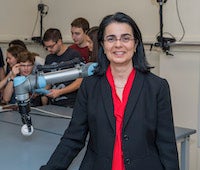Biomedical, data science training wins new grant

The Rice University NLM Training Program (NLMTP) in Biomedical Informatics and Data Science was awarded a $4.16 million grant from the National Library of Medicine (NLM), part of the National Institutes of Health (NIH).
This grant represents the seventh renewal of support for a program that began more than 30 years ago to foster interdisciplinary training among researchers in computational and biological sciences.


Interdisciplinary and multi-institutional grants awarded after a competitive review process support eight PhDs. A student and five postdoc fellows each year for five years. This unique program is one of only 18 programs nationwide. Other programs include those based at Stanford University, Harvard University, Yale University, and Columbia University.
Melissa Glueck of the Gulf Coast Consortium (GCC) manages training programs that include faculty from Rice, Baylor College of Medicine, University of Houston, University of Texas Health Science Center at Houston, and University of Texas MD Anderson Cancer Center. She attended the University of Texas Medical School (UTMB) in Galveston. NLMTP is the largest of her eight competitively funded training programs overseen by the GCC.
Lydia Kavraki, Principal Investigator and Program Director of NLMTP since 2015, said: She is a professor of bioengineering, mechanical engineering, electrical and computer engineering, and director of the Ken Kennedy Laboratory in Rice.
Program trainees are selected through a competitive application process and are co-supervised by two faculty members with complementary expertise. PhD students can compete for up to 3 years of support, and postdocs can compete for up to 2 years of support. Approximately 240 trainees have been supported so far. Trainees and their dual her mentors are selected from six of her NLMTP institutions.
“In this novel mentoring arrangement, a computational faculty and a biomedical science faculty or clinical researcher collaborate to mentor trainees, which has contributed to the success of the NLMTP since its inception,” said Kavraki. said.
46 core faculty with strong research and federal funding have been assembled for the latest update through 2027. Together he has supervised over 200 PhDs. student and his 130 postdoctoral fellows.
“Our greatest strength is our mentoring structure and our flexibility and willingness to help each trainee individually,” said Kavraki. “These, combined with our strong academic program, extensive research activities, well-equipped laboratories, and outstanding faculty and students, provide an unparalleled training environment.”
NLMTP has evolved strategically over time. The program was conceived as a computational biology training and led by the late Tony Gorrie, Rice’s Friedkin His Chair of Management and Professor of Computer Science. The program now encompasses advances in computation, data science, applied mathematics, statistics, biomedicine, modeling, data-driven reasoning and decision-making, and cognitive informatics to address biomedical problems .
The new grant will focus on biomedical informatics and data science, dynamic interactions with artificial intelligence including machine learning, and applications of biomedicine and human health and disease.
“Biomedical informatics broadly encompasses the design and implementation of new methodologies and techniques to solve challenging problems across the gamut of biology and medicine,” said Kavraki. “Our training program focuses on quantitative methods and data science. It is unimaginable to address biomedical problems in the future without a strong foundation in computer science, statistics and data science. ”
The program supports research in healthcare/clinical informatics, translational bioinformatics, and clinical research informatics. Collectively, these areas will advance personalized medicine, linking data and knowledge to health and disease, she said.
There are many successful Rice PhDs in this program. Students and postdoc alumni. Among the most recent trainees is Christine Peterson, her assistant professor of biostatistics at MD Anderson. Kevin Liu is an Assistant Professor of Computer Science and Engineering at Michigan State University. Sharon Chiang is a resident physician and researcher at the University of California, San Francisco. Risa Myers is an Assistant Professor of Computer Science at Rice. Athanasios (Nasos) Dousis is Director of Protein and RNA Engineering at Tessera Therapeutics. Raphael Rosengarten is CEO of Genialis Inc., a computational precision medicine company.
“I am most proud of my trainees,” Kaburaki said. “They have absorbed and combined elements from our rich environment and individual training to produce truly outstanding work.”
“NLMTP addresses a critical and growing need for researchers trained at the intersection of quantitative science and biomedicine. “This program provides rigorous training for Ph.D. students and postdocs from Rice and five other institutions. Our NLMTP is , is a testament to the strength of a united community.”
Kavraki said the NLMTP would not be possible without the collaboration of Rice, Baylor College of Medicine, the University of Houston, the University of Texas Health Sciences Center at Houston, MD Anderson and the UTMB.
- Image for download
-

Caption: Lydia Kaburaki.

Caption: Melissa Gluck.












